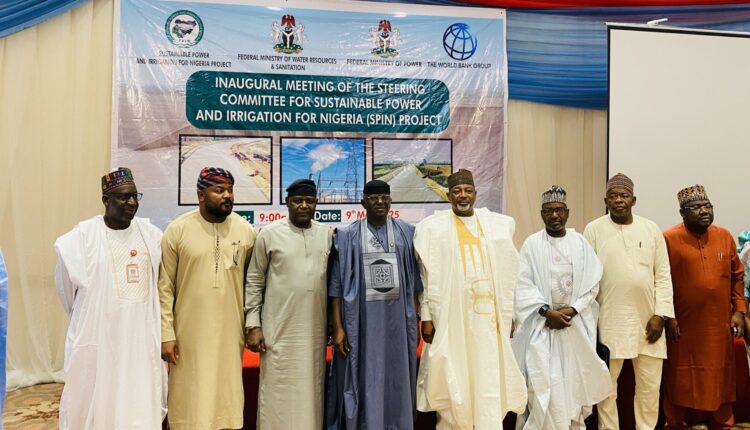The Federal Government has inaugurated the Steering Committee for the $500 million Sustainable Power and Irrigation for Nigeria (SPIN) project, a bold initiative aimed at bolstering national food security, water management, and climate resilience.
Supported by the World Bank, the SPIN project is designed to deliver large-scale multi-purpose infrastructure that combines irrigation and hydropower development to support Nigeria’s agricultural and energy sectors.
Speaking during the inaugural meeting of the committee in Abuja on Friday, Minister of Water Resources and Sanitation, Prof. Joseph Utsev, who co-chairs the committee with the Minister of Power, said the initiative aligns with President Bola Tinubu’s Renewed Hope Agenda.
“Nigeria is committed to improving its food, water, and energy security,” Utsev said. “Through this project, we are targeting 500,000 hectares of irrigated agriculture, 30 Gigawatts of sustainable energy, and strengthened resilience to floods, droughts, and climate change.”
Utsev noted that SPIN builds on the success of the Transforming Irrigation Management in Nigeria (TRIMING) project, which rehabilitated around 32,000 hectares of irrigation systems and empowered Water Users Associations (WUAs) across the country.
According to him, the SPIN initiative is structured around four key components: Institutional Strengthening, Irrigation Modernisation, Dam Safety and Operational Improvements, and Effective Project Management.
The project will be implemented through two models: Model 1 focuses on federal government-managed schemes in collaboration with willing states, while Model 2 supports state-owned irrigation schemes.
Out of 34 states that expressed interest, 27 have pledged to meet the project’s readiness criteria, and 17 states have already qualified. These states met three essential conditions—enacting WUA legislation, allocating budgetary support for WUA operations and maintenance, and establishing counterpart funding.
Utsev commended the SPIN Interim Team for conducting field assessments and preparing key documents including the Project Appraisal, Implementation Manual, and an 18-month work plan.
He emphasized that the Steering Committee, comprising Ministers from key sectors and Commissioners from participating states, will act as the apex decision-making body for SPIN.
Minister of Agriculture and Food Security, Sen. Abubakar Kyari, described the project as “timely” and a continuation of TRIMING’s progress in transforming Nigeria’s agricultural landscape.
“In every programme we implement, whether within our ministries or in partnership with international stakeholders, we must ask a fundamental question: What specific results will this project deliver?” Kyari asked. “In the case of agricultural production, what measurable outcomes are we targeting? Clarity on such goals ensures that our efforts are meaningful and result-driven.”
He noted that Nigeria’s rapidly growing population should be viewed as an opportunity for innovation and growth, not a burden.
Also speaking, Minister of Power, Mr. Adebayo Adelabu—represented by the Permanent Secretary, Mr. Mahmadu Mamman—reaffirmed Nigeria’s commitment to sustainable energy through hydropower.
“This initiative is a major step towards optimising the country’s water resources for long-term development,” he said.
He noted that the Power Ministry, as a key implementing partner, is working on project memos to attract private investment into hydropower development, calling hydropower a vital pillar in the nation’s energy transition due to its grid stability and compatibility with solar and wind energy.
Meanwhile, World Bank Task Team Leader for SPIN, Mr. Chinedu Umoru, praised the federal government’s commitment to the initiative.
“With this level of commitment, I am confident the federal government will achieve the objectives of the SPIN project,” Umoru said, urging stakeholders to match the government’s efforts to ensure nationwide impact.
The News Agency of Nigeria (NAN) reports that the inaugural meeting marks a statutory requirement for activating the World Bank financing arrangement.
The SPIN project is expected to significantly expand Nigeria’s irrigation capacity, ensure dam safety, and revitalise rural economies in line with the nation’s long-term development blueprint.


